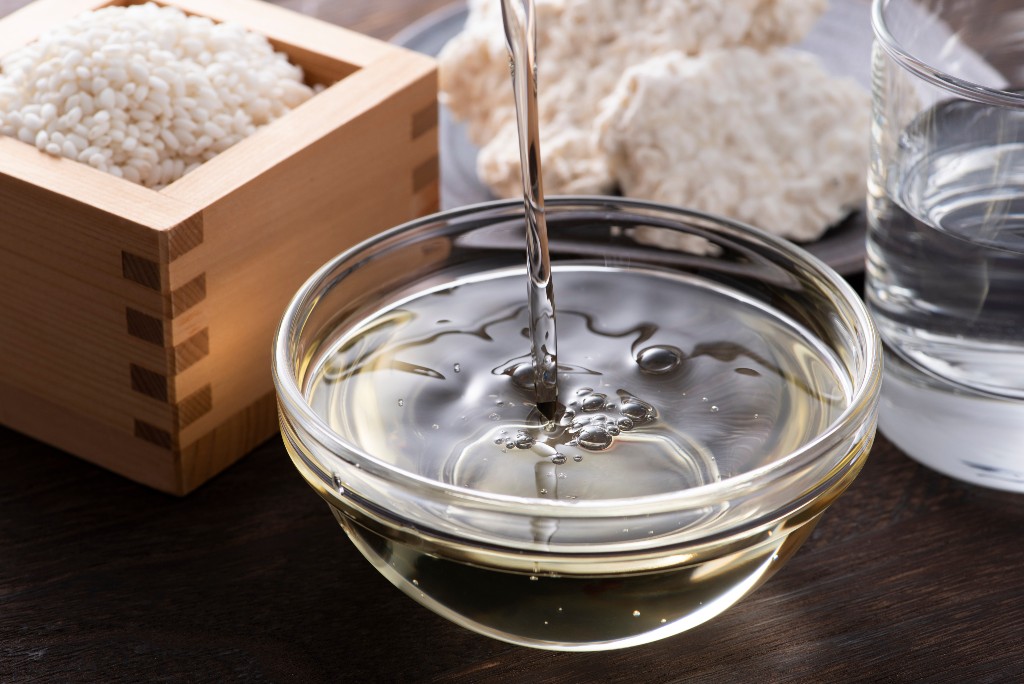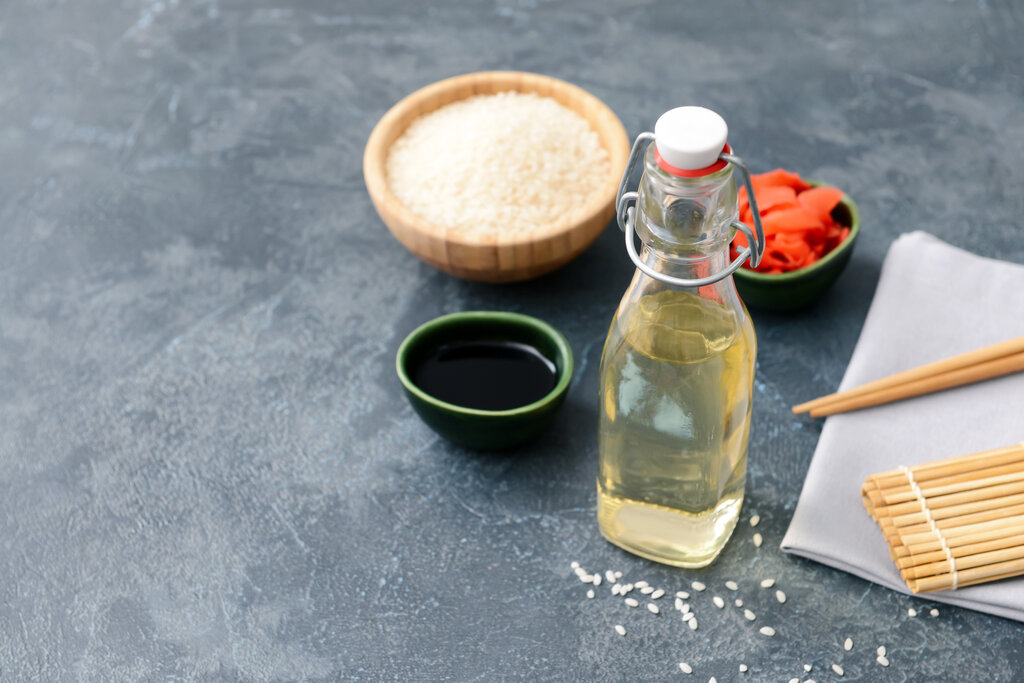
Teriyaki sauce just doesn’t taste the same without a splash of mirin! Like soy sauce, it’s one of the most popular and essential ingredients in Japanese cuisine, after all. It’s also used in sushi rice, salad dressings, dipping sauces, and a bunch of other tried and true recipes. So for those who want to recreate an authentic Japanese dining experience at home, this is definitely a must-have. But if you’ve already run out of this ingredient, then try a mirin substitute from this list!
Hon mirin (often shortened to “mirin”) is a kind of sweet rice wine with an alcohol content of 14 percent ABV. You can compare it to other kinds of Japanese rice wines like sake, but it does have a more pronounced sweetness. Coupled with a bright and mild umami flavor, mirin has a unique taste that you just can’t miss! In terms of appearance, it has a clear body and a subtle amber hue.
There are a bunch of condiments that you can mix into a dish to mimic the flavors of mirin. For one, there are alcoholic alternatives like the closely-related sake. On the other hand, there are kid-friendly, non-alcoholic substitutes as well. So check out all the possible alternative ingredients below.
Alcoholic Mirin Substitutes

Aji-Mirin
When we think about a major substitute for mirin, there’s nothing more obvious than aji mirin. But wait a minute, aren’t they the same? Despite having similar-sounding names, these two are actually different! In fact, the name of this condiment literally means “tastes like mirin.” Made with corn syrup and a bunch of other sweeteners, it tastes somewhat similar to the real thing — but with more pronounced sugar content. It’s a popular alternative because it’s more accessible in grocery stores than the traditional kind.
Sake
As mentioned, sake is also a kind of light-colored Japanese rice wine. The fact that it’s an alcoholic beverage of the same nature instantly makes it a strong candidate as a mirin alternative. It offers a similar depth of flavor, although we do recommend going for unfiltered types because of their sweet taste. If you’re in a pinch, however, drier varieties will do. Simply substitute each tablespoon of mirin for a teaspoon of sake, mixed with two tablespoons of granulated sugar or honey. It’s very easy to use as a mirin substitute for dishes like teriyaki meatballs!
READ ALSO: 11 Best Sake Substitutes For Japanese Cooking
Dry Sherry
Dry sherry is a kind of fortified or brandy-distilled wine from Spain. Apart from being a good cooking wine and dessert drink, it’s also a wonderful Japanese mirin substitute! Though it might be tempting to choose sweeter varieties for this purpose, we actually recommend using a tablespoon of dry sherry for each tablespoon of mirin in a recipe. This will result in just the right amount of sweetness, along with a crisp acidity that mimics the complex flavor of mirin. If a dish needs something sweeter, adding a small amount of white sugar should do the trick! And although sweetened dry sherry works as a great alternative to mirin, do note that mirin may not be the best option for a pure dry sherry substitute because of its sweetness.
Sweet Marsala Wine
As its name, sweet marsala wine is one of the most important ingredients in dishes like chicken marsala, but who would expect that it also works as a great mirin substitute? Sweet marsala wine is a kind of fortified wine from Marsala, Italy. It’s available in dry and sweet varieties, but for this purpose, we recommend going for the latter to capture the sweetness of the Japanese condiment. Overall, it has a nutty and caramelized brown sugar flavor that can definitely enhance the flavor of any dish. The ratio is 1:1 to substitute, so use a tablespoon of this sweet wine for each tablespoon of mirin that a recipe calls for. If you can only get your hands on dry marsala, mix it with sugar to make it sweeter.
Dry White Wine
Pop open a bottle of dry white wine with your best wine opener, because you can also use this alcoholic beverage as a mirin substitute! Basically, this is pure white wine sans the leftover grape sugars. In other words, it’s a wine that isn’t sweet. To achieve a level of sweetness and tartness similar to the Japanese condiment, you just have to mix it with sugar to taste. It also has lower alcohol compared to mirin with only 10% ABV. Although sweet varieties are available, we advise against using them because they typically aren’t ideal for cooking.
Vermouth
Vermouth is another kind of fortified wine that you can use as a mirin substitute. Compared to the ones we’ve mentioned, this one is flavored with herbs and spices. As you can probably expect, it has an aromatic and spicy depth at times. But really, what makes it a good alternative to rice wine is its level of acidity. A splash of this liquid can bring the flavor of your fried sushi dish to life! To achieve the best result, the trick is to mix a tablespoon or two of white sugar into every half cup of vermouth used in a recipe.
Chinese Cooking Wine
Also known as Chinese Shaoxing wine, this condiment is a kind of rice wine from Shaoxing, China. It’s a staple ingredient in stir-fries, dumpling fillings, and other Chinese cuisine favorites. Now, you can also add ‘mirin substitute’ to its long list of uses! Chinese rice wine may seem like just a different version of sake, but it’s mostly best for cooking. It could be too aggressive for some when raw, but it’s the perfect addition to dishes that demand a hint of brightness, subtle sweetness, and umami flavor. You’re also welcome to mix it with sugar so it tastes closer to the real deal. All in all, Shaoxing wine’s depth of flavor mimics that of mirin. That’s why there’s no question why it’s a go-to alternative for other home cooks.
Alcohol-Free Mirin Substitutes

Rice Vinegar
Also known as rice wine vinegar, this condiment is a kind of vinegar made with fermented rice. Some people might get confused, but this isn’t the same as mirin which is a kind of Japanese rice wine. However, you can definitely use this condiment as a fool-proof mirin substitute! While it may not be as sweet as the real thing, it offers a somewhat similar sharpness. Improve its flavor by mixing half a teaspoon of sugar for each tablespoon of vinegar that you plan to use.
White Wine Vinegar
White wine vinegar is another good mirin substitute. This is essentially just wine that has gone through the processes of fermentation and oxidation. As a result, it has a brighter and tangier flavor that you can’t really get from regular vino. It works as an alternative to mirin because of its acidic quality, although you have to tone it down a bit with some sugar. This way, it won’t be too aggressive and will have the signature sweet flavor of mirin. It doesn’t really work the other way though, since the sweetness of mirin affects its chances of being a suitable white wine vinegar substitute.
READ ALSO: What Is Oshinko? Learn All About It and How To Make Oshinko Roll
Balsamic Vinegar
Balsamic vinegar is a popular dark-colored Italian condiment used in salads, sauces, and other similar dishes. The traditional varieties are sweeter, more mellow, and a lot more expensive since they’re made from pure grape or unfermented grape juice. The ones you typically find in grocery stores combine grape must and wine vinegar, resulting in a tangier flavor. Whichever kind you have, you can use this rich-tasting condiment as a mirin substitute. For more sweetness, mix the vinegar first with your preferred amount of sugar to achieve the right taste.
White Vinegar And Sugar
Distilled white vinegar is the most common and most aggressive form of vinegar in the market. It only consists of acetic acid and water, after all. Expect a sharp mouth-puckering tartness from this condiment. To use it as a mirin substitute, mix each tablespoon of white vinegar with half a teaspoon of white sugar beforehand. No ifs or buts about that! Otherwise, your wakame salad dish might lack the hint of sweetness that mirin offers.
White Grape Juice
If you are not aware, there are different types of grape juices out there — and white grape juice is a wonderful non-alcoholic mirin substitute! What is it, you ask? It’s the extract of white-skinned grapes. Unlike the dark purple drink that most of us are used to, this variety has a light amber color that looks similar to mirin. It’s capable of bringing sweetness to a dish, but it lacks the tartness of the Japanese condiment. That’s when a splash of lemon juice or zest comes in handy. For the perfect concoction, add a tablespoon of citrus essence for each cup of fruit juice used.
Apple Cider Vinegar
Apple cider vinegar or ACV is another mirin replacement that’s fairly easy to find. If you don’t already have one in your pantry, you can just pick up one from a grocery store. It’s convenient, because there’s no need to scour a specialty shop to find it. Basically, ACV is just fermented apple juice. It has a bright and tart flavor, so you can freely use this condiment to substitute mirin in dishes like spring rolls. Although like most kinds of vinegar in this list, we highly encourage mixing apple cider vinegar with sugar first to give it some sweetness.
Kombucha
The most basic kombucha is just fermented black or green tea, and that’s all you need for a mirin substitute. While there are plenty of fruit-flavored varieties available, they may not be the best ingredients to mix into your savory Japanese dishes. If plain ones aren’t available, you can also make do with ginger-flavored kombucha. Like mirin, it can bring sweetness and acidity to a dish. Although take note that this carbonated drink is quite bubbly.
Agave Nectar And Water
For dishes that don’t demand a high level of acidity, you can simply mix one part agave nectar and three parts water to use as a mirin substitute. This is another excellent alcohol-free option since the “nectar” is just a kind of sweetener made from agave. The resulting concoction? A clear, bright amber liquid that tastes really sugary and honey-like.
Just a disclaimer: this doesn’t have the tartness and umami oomph of standard mirin.
Frequently Asked Questions
What are the ingredients of mirin?
The core ingredients of hon mirin are steamed mochigome (sweet glutinous rice), rice koji (cultured rice), and shochu (distilled rice liquor). These three are combined and left to ferment between two months to a couple of years. Usually, ones that are aged quicker have a lighter color and a more mellow flavor. So if you find yours a tad too tame for your liking, try darker ones for a stronger taste.
Are mirin and rice wine the same?
Technically, no. How so? Well, it’s true that mirin is a kind of rice wine. It’s a sweet Japanese rice wine, to be specific. However, not all rice wines can be called mirin, as there are also other kinds of rice wines in existence — like sake and Shaoxing for example.
Is mirin halal?
Unfortunately, hon mirin in its truest form isn’t halal. It’s a kind of wine after all, so it contains alcohol which is considered haraam or forbidden under Islamic law. However, there are lots of other alcohol-free substitutes that you can use instead of rice wine if you really want to try out certain recipes that call for this ingredient.











